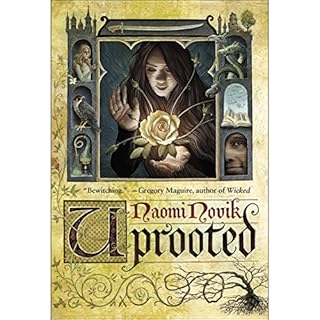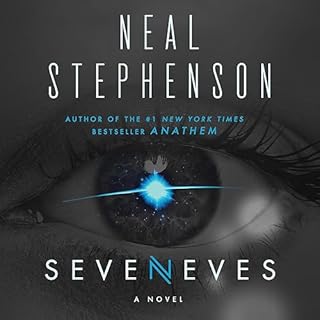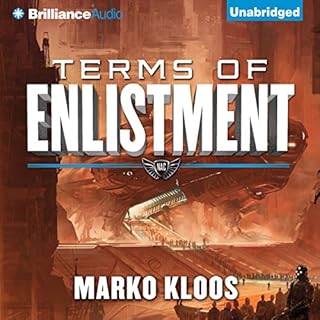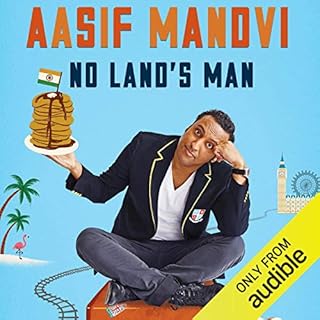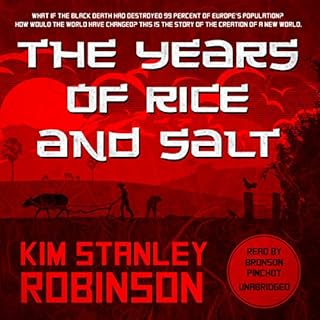Ryan
- 304
- reviews
- 4,506
- helpful votes
- 404
- ratings
-
Three Moments of an Explosion
- Stories
- By: China Miéville
- Narrated by: Nicholas Guy Smith, Bruce Mann, Hillary Huber, and others
- Length: 14 hrs and 55 mins
- Unabridged
-
Overall4 out of 5 stars 103
-
Performance4.5 out of 5 stars 92
-
Story4 out of 5 stars 93
London awakes one morning to find itself besieged by a sky full of floating icebergs. Destroyed oil rigs, mysteriously reborn, clamber from the sea and onto the land, driven by an obscure purpose. An anatomy student cuts open a cadaver to discover impossibly intricate designs carved into a corpse’s bones—designs clearly present from birth, bearing mute testimony to . . . what?
-
4 out of 5 stars
-
Reading Miéville is both Delicious AND Disturbing
- By Darwin8u on 08-13-15
- Three Moments of an Explosion
- Stories
- By: China Miéville
- Narrated by: Nicholas Guy Smith, Bruce Mann, Hillary Huber, MacLeod Andrews
Surrealist/weird fantasy mindscrews
Reviewed: 12-28-15
3.5 stars. China Mieville is an author that can be hit or miss with me in novel form, though I enjoy his baroque, surrealist imagination and his dedication to rethinking how fantasy is supposed to work.
The stories here are mostly more in the line of Borges or Kafka than what people usually think of when they think of fantasy, sci-fi, or horror, though there are touches of those genres (in their mainstream incarnation) here. The tone tends towards quietly unsettling, with some surreal element dropped into an otherwise recognizable world. A few go in a more obviously metaphorical or philosophical direction.
Mieville likes to create intricate realities and can be somewhat oblique, so many of the pieces took a second listen before their rewards revealed themselves to me. If you're a reader that's easily frustrated by stories that are ambiguous or not strongly plot-driven, this collection might not be for you. For the most part, it's all more in the vein of the City & The City than Perdido Street Station.
Highlights
Polynia: One day, icebergs materialize in the skies above London and float there, observed by a middle-school boy and his friends. Mysteriously unaffected by gravity or weather, the bergs remain for years, attracting explorers. They seem to be the reincarnations of melted icebergs lost to climate change. Quite haunting.
In the Slopes: On a small Mediterranean island, archeologists are digging out the remains of ancient villagers entombed in volcanic ash, a la Pompeii. But among them are the remains of otherworldly beings. Strange things happen when a local shopkeeper, the protagonist, gets involved in a petty squabble between two rival researchers. Lovecraftian without emulating Lovecraft.
Watching God: A Borges-esque piece about ships that pass by an isolated spit of land, but never visit the inhabitants, who are left to wonder if the occasional shipwrecks and reefings are meant to be some sort of a message. Heavily metaphorical.
The Buzzard's Egg: An old man imprisoned in a tower is responsible for caring for the idols that the surrounding empire has taken hostage from enemy lands. He has an amusing "conversation" with one god, but we gradually learn about this man and his history. Enjoyed the timeless feel of this one.
The Junket: A Quentin Tarantino-esque filmmaker who's a non-religious Jew makes a horror movie that plays off of anti-Jewish caricatures, but is murdered before he can explain his intentions. Critics and audiences can't agree on what to make of it.
The Design: A medical student in the 1930s discovers that intricate scrimshaw art is carved into the bones of a cadaver, but only confides in an associate who's a bit more than a friend. A very effective story about the weight of secrets and the unwanted attention they might bring you.
The less successful stories were still listen-worthy, but had slightly underwhelming Twilight Zone-like twists or were a bit too fuzzy in their magic realism for me. An obvious example is one about a therapist whose approach to separating her patients from their more toxic friends and lovers isn't quite as clever of a fictional twist as it wants to be. There are also several short "movie trailers" that are impressively imaginative, but have no apparent point besides that. Perhaps Mieville was floating some novel ideas, to gauge the response.
But, overall, it's a fairly good collection, highlighting the more literary side of this author. If you want straight-up weird fantasy, go with Perdido Street Station.
Something went wrong. Please try again in a few minutes.
You voted on this review!
You reported this review!
10 people found this helpful

-
All the Pretty Horses
- By: Cormac McCarthy
- Narrated by: Frank Muller
- Length: 10 hrs
- Unabridged
-
Overall4 out of 5 stars 1,507
-
Performance4.5 out of 5 stars 803
-
Story4.5 out of 5 stars 817
All the Pretty Horses, the first volume of the Borders Trilogy, tells of young John Grady Cole, the last of a long line of Texas ranchers. Across the border Mexico beckons; beautiful and desolate, rugged and cruelly civilized. With two companions, he sets off on an idyllic, sometimes comic adventure, to a place where dreams are paid for in blood.
-
5 out of 5 stars
-
This is LITERATURE
- By Steven on 11-21-04
- All the Pretty Horses
- By: Cormac McCarthy
- Narrated by: Frank Muller
American West Rites of Passage
Reviewed: 12-28-15
Cormac McCarthy is one of those authors who grabs me just through the power of his prose. Reading him is like looking at a harsh desert landscape at sunset, with bleached bones in the foreground and a fiery sky above the ancient rock formations. The view is foreboding, but undeniably gorgeous.
So far, I’ve only read two of his most harrowing books: The Road and Blood Meridian. All the Pretty Horses isn’t without disturbing scenes of violence, but it’s less extreme and might be more accessible to some readers.
The setting is southern Texas, sometime in the 1950s, and the parents of 16-year-old John Grady have just finalized their divorce, with the upshot being that John’s father will lose his ranch. So, John, restless and lacking a sense of his future, borrows two horses and runs away with his friend, Easy Rawlins. The two of them cross the border of Mexico, with the vague idea of finding work in that very foreign country. Soon, they wind up in the company of another runaway, a 13-year-old named Blevins, whose obstinacy and poor decision-making is often amusing, but who gets them (and himself) into serious trouble later in the book.
The feel of the book, with its vaguely archetypal characters, seems to acknowledge that the mythic landscape of Mexico and the Southwest did once lurk on the air currents of the real places. John Grady comes from a world with strong ideas about what manhood means, and has a fierceness well beyond the average teen, but he’s also just as ignorant and unformed as most teenagers. His experiences that follow echo a mythical rite of passage. He tames nature (in the form of wild horses), falls for the unattainable (but not entirely) daughter of a wealthy landowner, who considers her property to be guarded, is instructed about the nature of the world by various teachers, and must fight for his life in a dangerous prison. Eventually, he becomes a man, in his own way, but what does this new status mean? This is certainly a novel whose passages and symbolism could be analyzed to bits in a literature class.
But, it’s not a book that you need to. McCarthy’s prose is rich in atmosphere and sense of place, and the images he draws of a bygone world are both unsettling and beguiling. Frank Muller, a class act among audiobook readers, does a beautiful job with the narration, giving a subtly poetic cadence to the prose, and rendering different accents believably (though maybe he makes the boys sound a little too truculent).
The violence in McCarthy’s novels isn’t for everyone, but he’s truly a compelling writer with a distinctly American voice.
Something went wrong. Please try again in a few minutes.
You voted on this review!
You reported this review!
3 people found this helpful
-
Uprooted
- By: Naomi Novik
- Narrated by: Julia Emelin
- Length: 17 hrs and 44 mins
- Unabridged
-
Overall4.5 out of 5 stars 8,679
-
Performance4 out of 5 stars 7,957
-
Story4.5 out of 5 stars 7,922
Agnieszka loves her valley home, her quiet village, the forests and the bright shining river. But the corrupted Wood stands on the border, full of malevolent power, and its shadow lies over her life.
-
4 out of 5 stars
-
Great story, hard to listen to.
- By Rej on 05-21-15
- Uprooted
- By: Naomi Novik
- Narrated by: Julia Emelin
Enjoyable lightweight fantasy
Reviewed: 12-27-15
Though Uprooted has an interesting setup and seems to be well-loved by readers, I found this fantasy novel to be pretty middling. The premise is that there's a kingdom threatened by an evil, corrupting forest, which is warded off by a solitary wizard called the Dragon. Every ten years, the Dragon selects a peasant girl from one village to serve him for the same amount of time. Nobody really knows what he does with the girls, but when they return to the world, they aren't the same and soon leave the village.
The protagonist is a girl named Agnieszka, who, to her own surprise, is chosen. The wizard proves to be an irritable, difficult man whose social graces have worn off over decades (sort of like me after too long of a coding session), and treats her like a scullery maid. As the reader might expect in a story like this, Agnieszka turns out to have some latent magical abilities, and the Dragon turns out to have a heart under his crusty outer layer.
The plot is fairly standard stuff for fantasy, with a bit of romance novel thrown in. There's an arrogant, dangerous prince; a queen taken by the evil wood; a loyal best friend; a cold, scheming king; an oily rival wizard; nasty magical monsters, and an ancient people whose uncovered secrets are instrumental to the plot. Unsurprisingly, Agnieszka realizes that her talents are superior to the Dragon's in some ways, and the two of them discover that they must collaborate to fight The Wood. Also, they discover that they have the hots for each other (I had a bad "wood" pun in mind, but thought better).
If you've read a lot of fantasy novels, especially ones with a folkloric basis, there's nothing surprising here. I didn't find the writing very compelling or the characters very complex, though I was engaged enough to keep listening. It's really not a bad book, and I think that readers who haven't become jaded to the tropes of fantasy might like it, but it's not a very heavyweight entry to the genre.
There have been complaints about the audiobook reader. While I didn't find her performance terrible and didn't mind her accent itself, she speaks with a weird cadence that gets a little irritating. Imagine some text-to-speech software that reads in a Polish accent, and you'll have a sense of the way that some passages and bits of dialogue sound. Voice actors, you don't have to make foreign accents THAT exotic, especially if it's the protagonist's own inner voice.
If you really want to read this book, don't let my three stars discourage you, but it might be one to get on sale.
Something went wrong. Please try again in a few minutes.
You voted on this review!
You reported this review!
18 people found this helpful
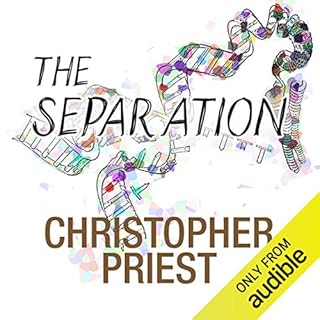
-
The Separation
- By: Christopher Priest
- Narrated by: Joe Jameson
- Length: 13 hrs and 30 mins
- Unabridged
-
Overall4 out of 5 stars 30
-
Performance4.5 out of 5 stars 28
-
Story3.5 out of 5 stars 28
The Separation is the story of twin brothers, rowers in the 1936 Olympics (where they met Hess, Hitler's deputy). One joins the RAF, and captains a Wellington; he is shot down after a bombing raid on Hamburg and becomes Churchill's aide-de-camp. His twin brother, a pacifist, works with the Red Cross, rescuing bombing victims in London. But this is not a straightforward story of the Second World War: This is an alternate history. The two brothers - both called J.L. Sawyer - live their lives in alternate versions of reality.
-
4 out of 5 stars
-
The lost moment of turning
- By Ryan on 12-27-15
- The Separation
- By: Christopher Priest
- Narrated by: Joe Jameson
The lost moment of turning
Reviewed: 12-27-15
Christopher Priest is a writer of meticulously constructed, Borges-esque literary puzzles, wherein narrators are unreliable, story elements sometimes contradict each other, and everything is open to different interpretations. In his “Dream Archipelago” books, there’s a secondary world, complete with its own geography and nation-states, that’s treated as being as true, if not more true than the reader’s reality.
An alternate reality also factors into this novel, but it’s one in which the Second World War ended differently, with Britain seizing a chance for an early separate peace with Germany, at a point when it became clear that continued fighting was in neither country’s interest. This isn’t much of a spoiler, since the novel opens in 1999 of this alternate timeline, just as a historian comes across a strange discrepancy in the records.
The novel that follows plays games with the two parallel realities, giving us the stories of two twin brothers, both called J.L., who compete together in the 1936 Olympics in Berlin, where a significant rift forms between them. In the years that follow, one brother, Jack, becomes a bomber pilot for the RAF, which the other, Joe, becomes a conscientious objector and serves as an ambulance man for the Red Cross. First, we hear Jack’s version of events, from his own journal, but other accounts that follow, including Joe’s, call some of its events into question.
For Jack, the war progresses and ends as it did in our world, but he finds himself haunted by his brother’s principles, as the Allied campaign of vengeance becomes more brutal. In Joe’s own story, he’s instrumental in peace negotiations between the British government and Nazi deputy fuhrer Rudolph Hess, leading to an armistice between Britain and Germany in 1941. In real life, Hess flew to Britain claiming to have peace terms, but was disowned by the Nazi government. But was something else going on?
The separation between the two timelines becomes somewhat muddled, in a way that hinges on confused identities, and Priest introduces a number of puzzles into the story, including the suggestion that several key figures besides the two J.L.’s have their own doppelgangers. I’m not sure I picked up on all the clues.
If you’re familiar with World War Two, though, it’s all pretty fascinating. The posturing Churchill and the creepy Hess are both convincingly written, with suggestions of motives more self-serving than met the eye. Priest plays with the idea that both realities and people contain more than one layer, and that one might come to the fore doesn’t negate the presence of the others. Perhaps a peace between Germany and Britain was closer to being a reality than the history books, with their convenient hindsight, lead us to think. Whether that’s true or not, it’s interesting to think about. Unlike some alternate history fiction, this novel challenges the conventional wisdom that our current course was the “best” one, even if the other course wasn’t better in every sense. In Priest’s “separate peace” vision, Britain retains more of its prominence and some portion of Europe’s Jews survive. Russia, meanwhile, suffers a worse fate, and the US becomes a paranoid, backwards place with a broken economy (nervous laugh here). Both Jack and Joe are haunted by doubts as to whether they did the right thing.
Christopher Priest’s novels aren’t for everyone, but I become more of a fan with each one. The lack of a conventionally structured plot, the ambiguity of the ending, and the too-convenient reliance on journals and letters in this novel will frustrate some readers. Others will appreciate the puzzles here and Priest’s finesse at bringing them forth. Audiobook reader Joe Jameson can be commended for handling a range of accents -- he nails Churchill’s.
Something went wrong. Please try again in a few minutes.
You voted on this review!
You reported this review!
9 people found this helpful
-
Seveneves
- A Novel
- By: Neal Stephenson
- Narrated by: Mary Robinette Kowal, Will Damron
- Length: 31 hrs and 55 mins
- Unabridged
-
Overall4.5 out of 5 stars 25,250
-
Performance4.5 out of 5 stars 23,082
-
Story4 out of 5 stars 23,075
A catastrophic event renders the earth a ticking time bomb. In a feverish race against the inevitable, nations around the globe band together to devise an ambitious plan to ensure the survival of humanity far beyond our atmosphere, in outer space.
-
3 out of 5 stars
-
Odd narrator choice
- By Josh Mitchell on 05-30-15
- Seveneves
- A Novel
- By: Neal Stephenson
- Narrated by: Mary Robinette Kowal, Will Damron
Fascinating speculation, a little flawed as story
Reviewed: 12-27-15
Neal Stephenson’s novels are ambitious, and Seveneves is no exception. Though this one has a few issues, which I’ll get to, it still has much to recommend it.
The setup is that a mysterious event in the very near future causes the moon to break apart into large chunks. The question of “why” is soon buried under the realization that many moon fragments are going to rain down on the Earth in about two years, scouring its entire surface clean of life.
It’s a scenario so awful that’s it hard to even begin to get one’s mind around it, and Stephenson, other than a few scenes here and there, seems to have decided that the emotional and psychological response of humanity to such an event wasn’t a worthwhile thing to focus on. Instead, his attention goes to the gears and wheels of how the world’s major countries might plausibly establish a small population in orbit, there to live out the next few thousand years. The first two thirds of the book explore this Ultimate Prepper Challenge, and center around two protagonists: Dinah, a classically blunt-spoken uber-geek who’s a master of robots, and “Doob” Dubois, a brilliant science popularizer clearly modeled after Neil Degrasse Tyson.
It’s all well-thought-out and interesting, and I learned a lot about the issues of living and operating in space. Yet, I wasn’t totally convinced by the plot, which relies on people being able to pull off heroic feats of engineering in a compressed timeframe, under profoundly demoralizing circumstances, without anything catastrophic going wrong. While accidents happen and individual characters go on suicide missions, the main danger to the space exodus is an implausible political situation that develops around the one-third mark. NS is great at explaining technical things interestingly over many pages, but he has a tendency to cram explorations of human psychology and motives into short, reductive character sketches. The political figure was a blatant straw man for the author to whack at, and several other characters were also more “types” than people.
At around the two-thirds mark, the space colonization story runs out of steam, and enters a sequence in which the few remaining humans make a crucial decision about the genetic future of their descendents. Then, suddenly, it’s five thousand years later, and we see that humanity, now established in giant space habitats, has split into seven distinct branches, each built around a different genetic line (hence the “seven Eves”).
I enjoyed this part of the book the most. The plot involves a special team of seven, representing all the races, coming together to travel to newly terraformed Earth to investigate a mystery hinted at in part one. The speculations on how an orbiting society might function, technologically, culturally, and politically, are the kind of thing NS does well. The division of humanity into “races” with distinct personality traits and mythos might be troubling in other hands, but is an interesting thought experiment here. The story and its colorful touches are fun, and closer to classic NS than the preceding portion, though the ending wrapped everything up a little too hastily for me. I wish NS’s editor had gotten him to geek out a little less in part one, and to focus a little more on being a fiction writer.
In sum, this wasn’t my favorite in his oeuvre (that would be Cryptonomicon or Anathem), but I did enjoy it. Like Reamde, it has some notable flaws. Audiobook reader, Mary Kowal, who handles part one, is pretty bad at foreign accents and overly dramatic with some characters. Will Damron, who takes part two, is much easier on the ears.
Something went wrong. Please try again in a few minutes.
You voted on this review!
You reported this review!
52 people found this helpful
-
Terms of Enlistment
- Frontlines, Book 1
- By: Marko Kloos
- Narrated by: Luke Daniels
- Length: 9 hrs and 36 mins
- Unabridged
-
Overall4.5 out of 5 stars 10,431
-
Performance4.5 out of 5 stars 9,537
-
Story4.5 out of 5 stars 9,514
The year is 2108, and the North American Commonwealth is bursting at the seams. For welfare rats like Andrew Grayson, there are only two ways out of the crime-ridden and filthy welfare tenements: You can hope to win the lottery and draw a ticket on a colony ship settling off-world...or you can join the service. With the colony lottery a pipe dream, Andrew chooses to enlist in the armed forces for a shot at real food, a retirement bonus, and maybe a ticket off Earth.
-
4 out of 5 stars
-
TICKET PUNCHER
- By Jim "The Impatient" on 11-16-14
- Terms of Enlistment
- Frontlines, Book 1
- By: Marko Kloos
- Narrated by: Luke Daniels
Middling military SF
Reviewed: 12-27-15
21-year-old Andrew Grayson lives in a thoroughly sh*tty future where the Earth is overpopulated, jobs are in short supply, and many North Americans live their entire lives as “welfare rats” in crummy, dangerous housing projects. The military no longer needs to put out recruitment ads, because it gets plenty of applicants who are willing to risk life and limb for a ticket at a paycheck and a more prestigious existence. Andrew is just one such.
It's a shame that such a familiar, unrisky plot follows such a great setup. Andrew goes off to boot camp, gets yelled at by drill instructors, does what he's supposed to, graduates, joins a "territorial" unit (read: the troops who break riots by impoverished citizens in North America's Fallujah-like ghettos), and does what he's supposed to, at least up until a moment when he gets in trouble with a desk officer for use of excessive force. This whole sequence suggests that Kloos read a few war memoirs and military SF novels, absorbed all their cliches, but didn’t really have anything fresh in mind to do with them. There's little dramatic tension as the protagonist does his job and is treated amicably by his veteran squad mates (do boots ever get treated nicely?). I wasn’t totally convinced by him, either. He’s a kid from the ghetto, but he has little trouble relating to characters from more privileged backgrounds and even knows the connotations of the term “kabuki theater” (I guess even welfare rats still read The New Yorker).
Also, there doesn't seem to be a whole lot of innovation posited for the armed forces of a century from now, other than a few bits of improved technology and the fact that everyone now showers together in the barracks, regardless of sex (sure, why not). Where are the drones? Where's the AI? In fact, the book's whole vision of the future doesn't really reach for more than modest differences from today, only some dystopian overtones.
Still, things do get a bit more interesting in the latter part of the novel, when Grayson is transferred into space after consequences of his excessive force incident make it politically expedient. There, he reunites with his pilot girlfriend and they and their fellows encounter a new alien species, which isn’t so friendly. People online have said that the second book in the series is an improvement. To his credit, Kloos is a pretty decent writer and doesn’t seem to have a despicable political agenda to push (see certain other mil-SF), so there’s hope. It’s really not a bad book, but it's nothing special, either. Classics like Starship Troopers, Ender’s Game, or the Forever War are better bets in the genre. Even Old Man’s War.
The audiobook performance is adequate, but doesn't add anything. The narrator doesn't inject much personality into Grayson, and does the other characters as stereotypes.
Something went wrong. Please try again in a few minutes.
You voted on this review!
You reported this review!
6 people found this helpful
-
The Water Knife
- By: Paolo Bacigalupi
- Narrated by: Almarie Guerra
- Length: 14 hrs and 1 min
- Unabridged
-
Overall4 out of 5 stars 3,991
-
Performance4.5 out of 5 stars 3,591
-
Story4 out of 5 stars 3,583
In the American Southwest, Nevada, Arizona, and California skirmish for dwindling shares of the Colorado River. Into the fray steps Angel Velasquez, detective, leg breaker, assassin, and spy. A Las Vegas water knife, Angel "cuts" water for his boss, Catherine Case, ensuring that her lush, luxurious arcology developments can bloom in the desert, so the rich can stay wet while the poor get nothing but dust.
-
4 out of 5 stars
-
The fight for water in a drought fueled apocalypse
- By Lore on 09-24-15
- The Water Knife
- By: Paolo Bacigalupi
- Narrated by: Almarie Guerra
Sci-fi’s prophet of environmental collapse
Reviewed: 12-27-15
The common theme in all of Bacigalupi's novels so far is that the people of tomorrow will be paying for the excesses of today. In The Windup Girl, we experienced a world where fossil fuels had all but run out, leading to an odd mix of futuristic and primitive technology, and bioengineering had created a bunch of other problems. In Shipbreaker and The Drowned Cities, the two Young Adult outings, we met young people struggling to make it to safety in a severely regressed North America.
The Water Knife is set in a nearer future than Bacigalupi’s other novels, and is a broadside against America’s wasteful attitude towards the environment. Here, the entire Southwest is suffering from a prolonged, damaging megadrought, and rights to siphon water from various rivers are now bitterly contested. Different cities and states are actively working against each other, sometimes with armed militias, and refugees from Texas are everywhere, often mistreated. One gets the sense that the US as a whole is coming apart, but Bacigalupi, who tends to confine his settings, doesn’t really fill in the bigger picture beyond the Southwest.
Three different character stories intersect. One follows Angel Velasquez, a fixer with a criminal background who works for a powerful CEO named Catherine Case. She builds water-efficient sealed housing complexes in the desert near Las Vegas, and uses more-or-less-legal methods to secure water for her projects, even if she denies the water to less powerful users. The second POV character is Lucy, an independent web journalist who covers the dying city of Phoenix, where life gets more dangerous all the time. The third thread follows Maria, a teenage refugee whose smart scheme to make a little extra money for her and her friend attracts the attention of the local crime boss, in very much the wrong way.
The plot that strings everything together, which has to do with some extra-old legal documents that another character unearthed before being brutally murdered, is a little trope-y, but the vivid reality that Bacigalupi creates for his characters is more memorable (I liked the touch of murder victims being left in empty swimming pools.) While he can be heavy-handed, his writing has a cyberpunk-like tautness, and his gut punches are often effective. Where other authors might be tempted to rescue their protagonists from having to do terrible things, Bacigalupi puts them in impossible moral positions. I admire that honesty. As in his other books, the "good" people tend to be victimized, and a certain amount of callousness becomes a necessary survival trait. There’s some ambiguity to Catherine Case, who could be read as a heartless CEO profiting from the suffering of other Americans, but also as a pragmatist who's simply allowing them to reap the bitter seeds that their lifestyle choices sowed, and offering a way of living that’s more compatible with reality.
This book’s conclusion suggests that Bacigalupi has a sequel in mind. If so, I’m sure I’ll read it. At this point, he’s earned himself a place on my list of most compelling current writers. He can both tell a story and get us to appreciate that technology might not rescue us from the problems building up around us.
A last note: though there are hints at a shared universe with his YA novels, this one’s not for kids. There’s a pretty adult “romantic” encounter, and some harrowing scenes of brutality.
Something went wrong. Please try again in a few minutes.
You voted on this review!
You reported this review!
13 people found this helpful
-
No Land's Man
- A Perilous Journey through Romance, Islam, and Brunch
- By: Aasif Mandvi
- Narrated by: Aasif Mandvi
- Length: 4 hrs and 23 mins
- Unabridged
-
Overall4 out of 5 stars 1,276
-
Performance4.5 out of 5 stars 1,152
-
Story4 out of 5 stars 1,148
If you're an Indo-Muslim-British-American actor who has spent more time in bars than mosques over the past few decades, turns out it's a little tough to explain who you are or where you are from. In No Land's Man Aasif Mandvi explores this and other conundrums through stories about his family, ambition, desire, and culture that range from dealing with his brunch-obsessed father, to being a high-school-age Michael Jackson impersonator, to joining a Bible study group in order to seduce a nice Christian girl, to improbably becoming America's favorite Muslim/Indian/Arab/Brown/Doctor correspondent on The Daily Show with Jon Stewart.
-
4 out of 5 stars
-
Witty and Thoughtful
- By The Reading Date on 11-06-14
- No Land's Man
- A Perilous Journey through Romance, Islam, and Brunch
- By: Aasif Mandvi
- Narrated by: Aasif Mandvi
The humor and pathos of not quite fitting in
Reviewed: 12-27-15
In this short but enjoyable audiobook, former Daily Show correspondent Aasif Mandvi mines his life as a Indian-British-American-not-particularly-devout-Muslim struggling actor for amusing stories or poignant reflections on trying to establish an identity when you don't really fit in to begin with. Some are laugh-out-loud hilarious, such as his accounts of his enthusiastic but somewhat embarrassing (to his teen self) Indian parents. Others offer cultural commentary from an outsider's perspective, not really casting a flattering light on the casual racism a brown-skinned person sometimes encounters in the US or an industrial British city. Others are gently funny, such as an account of showing up stoned at Brooke Shields' New Years Eve party and having to deal with the inner voices of his thirteen-year-old self, who had a crush on her, and a middle school bully, both of whom are personified as characters. There's some insight into the value of having a "senior Muslim correspondent" on the Daily Show, even if not a particularly devout one. And I could relate, from a similar set of events in my life at the same age, to his college experience of letting himself be wooed (for Jesus) by a very Christian girl, even as he entertained desperate hopes that their relationship would take a different direction.
As one might expect, given his affiliation with Jon Stewart, Mandvi has a good grasp of absurdity, irony, sincerity, and hopefulness. And his reading voice, which morphs effortlessly from a Brooklyn accent to an indignant Indian father to a thick Yorkshire dialect as the narrative demands, is part of the charm. If he's not in quite as zany as, say, David Sedaris, his pieces show that America's melting pot still brings its own share of humor, insight, and talent to the table.
Something went wrong. Please try again in a few minutes.
You voted on this review!
You reported this review!
30 people found this helpful
-
The Years of Rice and Salt
- By: Kim Stanley Robinson
- Narrated by: Bronson Pinchot
- Length: 25 hrs and 56 mins
- Unabridged
-
Overall4 out of 5 stars 1,010
-
Performance4.5 out of 5 stars 902
-
Story4 out of 5 stars 900
It is the 14th century, and one of the most apocalyptic events in human history is set to occur - the coming of the Black Death. History teaches us that a third of Europe's population was destroyed. But what if the plague had killed 99 percent of the population instead? How would the world have changed? This is a look at the history that could have been - a history that stretches across centuries, a history that sees dynasties and nations rise and crumble, a history that spans horrible famine and magnificent innovation.
-
5 out of 5 stars
-
Robinson's best; Pinchot's usual excellence
- By Alex Levine on 05-13-15
- The Years of Rice and Salt
- By: Kim Stanley Robinson
- Narrated by: Bronson Pinchot
Cerebral but interesting alt history
Reviewed: 12-27-15
Alternate history is a genre I enjoy, and this book often appears on "best of" lists, usually somewhere under classics like The Man in the High Castle or Pavane. I figured it was worth a read.
The point of divergence from our own timeline takes place in the 1300s, after the Black Plague wipes out virtually all of Europe, except for tiny populations on remote islands. A Mongol warrior comes into Poland/Hungary with a small scouting party, and discovers a land bereft of all but corpses. He reports back to his Khan, attracts the man's anger, then flees back into Europe, where he wanders around for a while, before being taken by Muslim slavers. He ends up being sold in Egypt, where he befriends an African slave boy who has a somewhat different outlook on the world. Eventually, they both die, meet in purgatory, and are reborn into new lives.
This sets up the template that the rest of the book follows. The protagonists, who I couldn't really tell apart, appear at important junctures in the world's subsequent history, and help steer it in one direction or another, while undergoing their own climb towards enlightenment. It's a little facile of a device (I preferred the enigmatic connections across eras in David Mitchell's Cloud Atlas), but it didn't get in the way.
The alternate history aspects of the novel are more interesting. Robinson's speculations on how the world might have developed absent Europeans are well thought out. It's not a stretch to suppose that China and the Islamic world would have become the two main poles of the civilized world, with India caught between them. There probably would have been a scientific revolution somewhere in the Islamic world, as well as a liberal, reformist movement in newly colonized territories. North America might well have been discovered by Chinese sailors blown off course into the Aleutians, and explored by Japanese fleeing Chinese oppression. The industrial revolution might well have begun in India.
Some ideas seem a little wishful. Might Native Americans have united into a proto-democracy, with a little help from refugees from other places? Might scientists delving into atomic physics in the wake of a horrific world war have collectively decided not to pursue the bomb? The more fantastical elements of the story come into play at such times, with characters "remembering" wrong turns from previous lives. Other chapters crib heavily from real world history, but with the actors and a few cultural details changed around.
This isn't necessarily an "exciting" book. Often, the characters sit around discussing philosophy, religion, science, law, the evolution of culture, etc., caught in the thinking of whatever era they're in, but eager to argue about different paths forward. Yet, this is the sort of thing I enjoy, so I didn't mind so much. In the background is the interesting theme of: could we change the future for the better if we brought the lessons of the past to it? Or is history a river that can't quite be tamed? One chapter expresses it quite literally.
I don't think I would put this at the top of my personal list of alternative history novels; it's not quite as literary as Pavane, nor is it as mind-bending as The Man in the High Castle. But it is a richer reading experience than Harry Turtledove, and it does cast a light today's major non-Western cultures. By showing how they might have evolved without the influence of the West, he gets us to ponder directions they may yet evolve in, or are already doing.
Something went wrong. Please try again in a few minutes.
You voted on this review!
You reported this review!
24 people found this helpful
-
Panzer Commander
- The Memoirs of Colonel Hans von Luck
- By: Hans von Luck, Stephen E. Ambrose - introduction
- Narrated by: Bronson Pinchot
- Length: 15 hrs and 9 mins
- Unabridged
-
Overall4.5 out of 5 stars 2,382
-
Performance4.5 out of 5 stars 2,211
-
Story4.5 out of 5 stars 2,209
A stunning look at World War II from the other side.... From the turret of a German tank, Colonel Hans von Luck commanded Rommel's 7th and then 21st Panzer Division. El Alamein, Kasserine Pass, Poland, Belgium, Normandy on D-Day, the disastrous Russian front - von Luck fought there with some of the best soldiers in the world. German soldiers. Awarded the German Cross in Gold and the Knight's Cross, von Luck writes as an officer and a gentleman.
-
2 out of 5 stars
-
Reads like Forrest Gump ( a fiction )
- By Randall on 11-08-16
- Panzer Commander
- The Memoirs of Colonel Hans von Luck
- By: Hans von Luck, Stephen E. Ambrose - introduction
- Narrated by: Bronson Pinchot
Humanity in the professional soldier
Reviewed: 12-27-15
Not quite what I was expecting. I imagined that this would be a cold and clinical book on the nature of tank warfare (a topic I was curious about, having done work on military simulations). Instead, the author, who comes across as a friendly, gregarious man, spends little time on the technical details of war and writes about his impressions of places he was sent to and people he met.
Von Luck isn't a great writer, but he served on several different fronts (Eastern, Africa, Western) and spent five years in Russian captivity, and has lots of interesting anecdotes. We learn how chronically undersupplied the German military was post-1941, how civilians saw them (many people in Soviet territory or Africa welcomed them at first, and some were unaware of the outcome of the First World War), what it was like to be on the receiving end of Allied attacks, and how German civilians felt under increasingly harsh air raids. The time he spends doing forced labor in the Soviet Union certainly reveals a lot about the mentality of Russians, who were often "employed" in ways not much better. Von Luck does seem to hold a positive view of most civilians and soldiers he meets, regardless of side or country, so there's a strongly optimistic feel to the book -- though perhaps the space of decades between experience and writing helped.
The parts of the story set in North Africa are especially interesting, as it appears that both sides tried to fight the war in a gentlemanly, chivalrous way, looking after each other's wounded, having occasional truces, and so forth. Maybe "chivalry" wasn’t much comfort to those about to die, but there were definitely nastier theaters of World War Two.
As for Hitler, there's a certain recurring rationale one gets in the memoirs of former Wehrmacht officers, and it goes: "we were just regular soldiers fighting for Germany and we didn't know the full extent of what the Nazis were up to, nor did we like them much anyway. Especially not at the end, when they screwed us over and justified it with insane propaganda." Any readers looking for self-recrimination will find that Von Luck's personal narrative sticks to this familiar line. While he was apparently aware of atrocities in locations behind his line, he blames them on rear-echelon and political units, and insists that his own men behaved correctly towards civilians and captured enemies. To be fair, I doubt the Russians would have let him go if they'd been able to pin any war crimes on his troops, and he did seem to make lifelong friends among his former British, American, and French enemies.
As World War Two memoirs go, this isn't the most riveting one I've come across, but it shows that decency had existed inside the German officer class, before fascist brainwashing infected the armed forces. That things could go so wrong is why I sometimes worry about the politicization of the military in the US, given some of the crazier segments of right-wing politics.
Something went wrong. Please try again in a few minutes.
You voted on this review!
You reported this review!
10 people found this helpful


